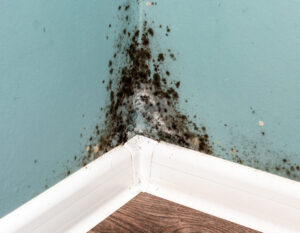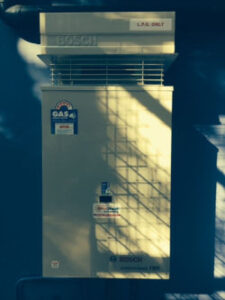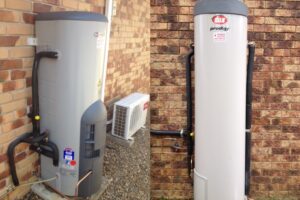Most prospective homeowners know how important it is to have a property inspected by both a building inspector and a pest inspector before purchasing. However, many people make the mistake of assuming that the building inspection includes a thorough inspection of the plumbing system. Unfortunately, without hiring a professional to inspect the plumbing system you could end up purchasing a house with serious plumbing issues that could cause thousands of dollars of damage to the property.
To avoid the nasty surprise of purchasing a house only to find that there are serious plumbing issues that will be expensive to fix, and even more expensive if left unchecked, follow our plumbing checklist for home buyers.
⬜ Check Water Pressure

One easy check that you can do when inspecting a property is turn on all showers, testing both hot water and cold water. This will allow you to gauge the water pressure, as no one wants a home with low pressure taps and showers. Additionally, low water pressure can be a sign of bigger plumbing issues.
⬜ Check Taps

Another simple plumbing check you can do while inspecting a property is turning on each faucet in the house including bathtubs and sinks. As you do so, listen for a hammering noise when the water flows through the pipe. This noise occurs when the water suddenly stops or changes direction due to a valve suddenly closing. The pressure caused by this can cause further problems, from mild vibration to a collapsed pipe.
You should also check that none of the faucets in the house leak once you turn them off.
⬜ Check For Leaks
Before purchasing a new home you should conduct a thorough check for leaks. When looking for leaks you should be checking around taps and under sinks for any signs of water damage or pooled water. If you do find traces of a leak, try and follow the water to find the cause of the leak.
This is important as some leaks are much easier to fix than others. For example, a leaking tap is simple and inexpensive to repair. However, even a leaking tap, when left unfixed, can cause considerable damage to the property, including causing irreparable damage to the vanity and even weakening the floor.
Similarly, leaking toilets can cause serious damage to the floor. To check for a leaking toilet, look for discolouration or warping around the base of the toilet. You can also try standing on the floor near the base of the toilet to feel if it moves at all under pressure.
You should also check that there are no leaking or corroded pipes connected to each toilet. Any identified leaks should be fixed before settlement as left unchecked, leaks can cause serious damage to a property.
⬜ Check Toilets

When inspecting the plumbing of the house you should flush each toilet, ensuring that all toilets empty and refill correctly. When doing so, check if any toilets have a weak flush or stay running too long after being flushed. Additionally, listen for a gurgling noise after flushing as this can be an indication of a problem.
You should also try to wiggle the base of the toilet. If there is movement this can indicate a weakened seal. Alternatively, a loose toilet base could mean that the toilet bowl is not secured to the flange. This should be addressed as soon as possible as it could cause a leak and damage to the property.
⬜ Check Floors
In addition to checking the floor around toilets, you should also check for discolouration or warping on the floor surrounding the dishwasher, washing machine, and refrigerator. Look for any soft spots as this is an indication that there is a nearby leak.
In a multi-storey house, it is also important to inspect the ceiling beneath bathrooms and laundry rooms for discolouration or wet spots that could indicate a leak.
⬜Check Pipes
When inspecting a home it is also important to check for any factors that could cause the water drainage system to become clogged. For example, pipe size. Pipes should be a minimum of ¾†from water source to house and ½†to faucets. This is also essential in ensuring that the water pressure to the house is sufficient.
This is an important part of the pre-purchase plumbing check. If you’re not sure what to look for or how to check the size of the pipes you should hire a professional to complete the check for you.
⬜ Check Hot Water System

One of the most important things to check when inspecting a house before purchasing is the hot water system. Hot water systems last for an average of 10 to 15 years, and with an average replacement cost of between $1500 to $3500, it is important to find out exactly how old the hot water system in your potential new home is.
When inspecting the hot water system, note the model and serial number as any plumber will be able to estimate the age of the system for you based on those details. Alternatively, you can ask the real estate agent for the year of replacement. You should also ask when the system was last professionally serviced as this will give you an idea of how well maintained the system is.
You should also check the condition of the hot water heater. To do so, look for signs of corrosion, as not only will this mean that the system may require repair, corrosion may also enter the water which can cause health issues. Similarly, check for any leaks from both the hot water system itself, and the pipes connecting to it. If the hot water system is too old or damaged, ask for it to be replaced.
Finally, note the location of the system (eg. indoors or outdoors) and consider how much damage would be caused to the property in the event of a leak.
⬜ Hire A Professional
If you’re not sure exactly what to look for in any of these steps, it is essential to hire a professional plumber to perform a thorough inspection of the house and its plumbing system before purchasing. Hiring a professional makes the inspection process simple as they know exactly what to look for, and can give you an idea of how pressing any identified issues may be, as well as an estimated cost of repair.

Sun City Hot Water & Plumbing are your local hot water specialists. Call us today on 1300 728 122 for all of your plumbing needs.





